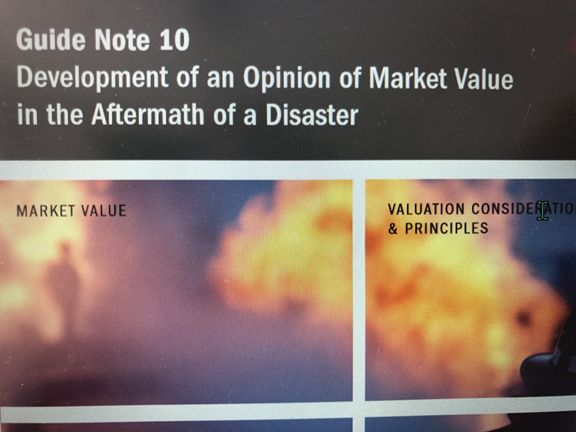本次席卷全球的疫情对评估行业的影响极为深重。由于需要收集、分析基准日市场和资产相关资料及履行现场评估程序等共性问题,各国评估行业都面临评估程序受限、基准日前后事项考虑等问题。在沉寂一段时间之后,近期各国评估行业组织似乎在忙乱之中突然苏醒过来,纷纷出台一些政策、指南或声明,力图从相关专业问题和评估行业的角度对如何应对疫情以及疫情对评估的影响进行指导。CVI一直持续跟踪研究这方面的进展。
其实,国际上老牌的评估协会早就对大型突发灾害之后的评估问题进行了研究和准备。2008年金融危机之后,美国评估师协会等就曾紧急发布关于市场剧变时期折现率调整的专业指导文件。而历史悠久的美国评估学会(AI)在应对突发灾害对评估工作影响领域应当说最有先见之明,准备得最为充分。早在2010年AI就发布了《指南10-灾害之后形成市场价值意见》(以下简称指南10,GUIDENOTE 10--Developing an Opinion of Market Value in the Aftermath of a Disaster)。指南10是国际评估领域相关领域中较为少见的专业文件,体现了一个专业行业协会应有的担当和智慧。指南10讨论的原则、内容虽然主要针对涉及不动产的市场价值评估业务,但对于其他评估领域以及非市场价值的评估业务也具有较好的理论和实务指导意义,其中相关观点不乏精彩之处,在当前疫情影响严重的背景下,研读该指南具有特别的意义。
CVI对该指南进行摘译、讨论,引它山之石,供同行参考。
一、背景
美国在过去20年经历了多次恐怖袭击、大规模超常自然灾害以及大规模人为灾害,都在一定程度上对评估行业提出了重大挑战。总体而言,这些灾害分为自然灾害和人为灾害,包括飓风、洪水、龙卷风、地震、海啸、火灾、冬季雪暴等自然灾害,以及恐怖袭击、暴乱、金融恐慌等人为灾害。美国评估学会(AI)主要关注不动产评估,由于不地产市场受灾害影响严重,往往在灾害之后不动产市场会出现不稳定甚至混乱的状况。在这种市场上评估师对市场数据进行分析是极其困难的,因此,无论从评估师的角度还是从客户(评估服务使用者的角度),都对此领域的评估提出许多问题,希望能够得到有效的指导。作为对此种需求的适时回应,美国评估学会(AI)于2010年11月5日发布了《指南10-灾害之后形成市场价值意见》(GUIDENOTE 10--Developing an Opinion of Market Value in the Aftermath of a Disaster),并于2018年进行了细微修改。正如指南10所指出,AI希望通过此专业文件的发布,对准则的相关要求如何在特别情况下应用提出针对性指引。
美国评估学会在不动产评估基本理论研究方面具有深厚的历史,此点在之前的《CVI研究--新冠疫情对估值的影响讨论之二》(见2020年3月5日CVI公众号)曾予以特别讨论。因此在讨论灾害时期评估的特殊问题时,指南10并未就具体问题展开讨论,而是按照惯常的思路,首先从市场价值的基本定义及评估的基本原则出发,分析灾害事件对市场价值定义要素及基本原则的影响,进而提出相关建议。这种负责、扎实的思路确实值得各国评估行业学习。
二、市场价值的特征(Characteristics of “MarketValue”)
AI在指南10中首先列举了美国评估准则(USPAP)、不动产评估词典(TheAppraisal Institute’s The Dictionary of Real Estate Appraisal, 6th Edition)、联邦金融监管当局、国际评估准则等较权威的专业文件、部门所给出的市场价值定义,要求评估师熟知。
1、USPAP中市场价值定义为:
MARKETVALUE: a type of value, stated as an opinion, that presumes the transfer ofa property (i.e., a right of owner- ship or a bundle of such rights), as of acertain date, under specific conditions set forth in the definition of the termidentified by the appraiser as applicable in an appraisal.
Comment:Forming an opinion of market value is the purpose of many real propertyappraisal assignments, particularly when the client’s intended use includesmore than one intended user. The conditions included in market valuedefinitions establish market perspectives for development of the opinion. Theseconditions may vary from definition to definition but generally fall into threecategories:
1. therelationship, knowledge, and motivation of the parties (i.e., seller and buyer);
2. theterms of sale (e.g., cash, cash equivalent, or other terms); and
3. theconditions of sale (e.g., exposure in a competitive market for a reasonabletime prior to sale).
2、不动产评估词典中市场价值定义为:
Themost widely accepted components of market value are incorporated in thefollowing definition: The most probable price, as of a specified date, in cash,or in terms equivalent to cash, or in other precisely revealed terms, for whichthe specified property rights should sell after reasonable exposure in acompetitive market under all conditions requisite to a fair sale, with thebuyer and seller each acting prudently, knowledgeably, and for self-interest,and assuming that neither is under undue duress.
3、金融监管部门规则中的市场价值定义为:
The most probable price that a property shouldbring in a competitive and open market under all conditions requisite to a fairsale, the buyer and seller each acting prudently and knowledgeably, andassuming the price is not affected by undue stimulus. Implicit in thisdefinition is the consummation of a sale as of a specified date and the passingof title from seller to buyer under conditions whereby:
• Buyerand seller are typically motivated;
• Bothparties are well informed or well advised, and acting in what they considertheir best interests;
• Areasonable time is allowed for exposure in the open market;
•Payment is made in terms of cash in U.S. dollars or in terms of financialarrangements comparable thereto; and
• Theprice represents the normal consideration for the property sold unaffected byspecial or creative financing or sales concessions granted by anyone associatedwith the sale.
(12C.F.R. Part 34.42(g); 55 Federal Register 34696, August 24, 1990, as amended at57 Federal Register 12202, April 9, 1992; 59 Federal Register 29499, June 7,1994)
4、国际评估准则中市场价值定义为:
...theestimated amount for which an asset or liability should exchange on thevaluation date between a willing buyer and a willing seller in an arm’s-lengthtransaction after proper marketing and where the parties had each acted knowledgeably,prudently, and without compulsion.
指南10指出虽然不同权威出处的市场价值定义有所不同,但基本上从以下三个方面反映了对市场价值的共同认识:
1、市场价值是当事方具有典型动机、知晓充分信息并以自身利益最大化为目标的结果;(Marketvalue results when the parties are typically motivated, are generally wellinformed, and are acting in their best interest; )
2、市场价值是相关资产在市场上以适当的期间进行展示的结果;(Market value results when the property is exposed on the market for areasonable length of time;)
3、支付的对价是现金或其等价物(Payment is in cash or its equivalent.)
指南10指出评估师需要在混乱或不稳定市场上特别谨记市场价值的这些特征。灾害过后,市场价值的这些特征在相关交易中往往是缺失的。例如,买方和卖方可能会在拥有足够信息前就需要做出交易决定;由于灾害的影响,他们可能会过于急于出售或购买资产;资产在市场上的展示时间可能会大大延长,也可能会瞬时成交;灾害过后市场交易活动有可能实质性停止,潜在买方或卖方会取消购、售计划。此种情况下,数据的缺乏对评估师提出严峻的挑战。
三、评估基本原则的应用(Applicability of BasicValuation Principles)
指南10秉承AI一贯的扎实研究风格,强调无论市场状况是否处于混乱,任何评估问题都需要依据公认评估方法和原则予以解决。对这些公认方法、原则的理解有助于将复杂的业务简单化,避免被具体的问题所迷惑。在灾害之后的评估业务中,指南10强调需要特别注意理解和应用评估的七个基本原则,即供求原则、预期原则、变化原则、替换原则、贡献原则、外部影响原则和平衡原则,并再次简明阐述了这七个原则的内涵,摘录如下:
SUPPLY AND DEMAND
Ineconomic theory, the principle that states that the price of a commodity, good,or service varies directly, but not necessarily proportionately, with demand,and inversely, but not necessarily proportionately, with supply. In a realestate appraisal context, the principle of supply and demand states that theprice of real property varies directly, but not necessarily proportionately,with demand and inversely, but not necessarily proportionately, with supply.
ANTICIPATION
Theperception that value is created by the expectation of benefits to be derivedin the future.
CHANGE
Theresult of the cause and effect relationship among the forces that influencereal property value.
BALANCE
Theprinciple that real property value is created and sustained when contrasting,opposing, or interacting elements are in a state of equilibrium.
SUBSTITUTION
Theappraisal principle that states that when several similar or commensuratecommodities, goods, or services are available, the one with the lowest pricewill attract the greatest demand and widest distribution. This is the primaryprinciple upon which the cost and sales comparison approaches are based.
CONTRIBUTION
Theconcept that the value of a particular component is measured in terms of itscontribution to the value of the whole property, or as the amount that itsabsence would detract from the value of the whole.
EXTERNALITIES
Theprinciple that economies outside a property have a positive effect on its valuewhile diseconomies outside a property have a negative effect upon its value.
四、评估考虑事项(Valuation Considerations)
指南10在讨论七大评估基本原则之后,结合相关评估原则对灾害事项进行分析,指出:
● 灾害对决定资产价值的因素如社会趋势、经济条件、政府管制、环境因素等造成影响;灾害之后影响价值的因素如效用、稀缺性、意愿和有效购买力等都会发生较大变化。
● 灾害可能会对供应端和需求端都产生实质性影响,导致供求失衡。市场上可能会观察到急剧上涨的报价,这些高价是否代表“市场价值”?交易的当事方是否具有“典型动机”以及是否“以其利益最大化”为目标(是否是不合理的行为)?资产是否在市场上展示了足够长的时间?
● 替代原则、贡献原则以及外部因素原则有助于回答这些问题。明确标的资产的市场区域十分重要。通常情况下,标的资产所在市场区域的所有资产都会受到相似灾害影响。“典型的”动机和“合理的”展示时间因素等应当根据同一期间在该市场区域观察的情况确定。换言之,“正常”需要重新定义。
● 预期原则和变化原则与灾害之后的评估关系度很大。灾害之后会出现较大的不确定性,这些不确定的影响是能够明显感知的,但对其计量是很困难的。不确定性增加意味着业主和投资者的风险在上升,而这些风险上升可能会反映在更高的资本化率和折现率上,也可能会体现在用于折现的价格上。
● 评估师需要特别关注评估基准日事项。可比数据必须选取相同市场区域,反映相同的市场状况。灾害之前发生的交易不能反映其后的市场状况。
● 在某些重大变化的事件之后,市场上可能会很少有可比交易案例。评估师需要根据其他灾害影响地区的经验、信息的角度考虑一些额外的数据,但需要确信数据的可比性。
● 在基准日设在灾害时点之前的追溯性评估业务中,评估师需要依据评估基准日之前的数据,这些数据尚未受到灾害事件的影响。评估师在此类追溯性评估中的困难在于无法获得标的资产于基准日的资产特征的第一手信息,必须依赖所能获得的关于基准日标的资产的最佳信息。此类业务中,评估师将会做出一个或多个特别假设,以假定资产状况和其他特征的真实性。
● 评估基准日设在灾害时点之后的评估业务则存在更多的难题。如果无法获得灾害时点之后的交易数据,将需要对之前发生的数据或交易进行修正以反映市场状况。这种修正是很困难的,评估师采用这些数据和修正市场状况时需要特别小心。随着时间的推移,会有更多的交易发生,产生更多的数据可用于分析。但在此之前,评估师只能根据能够获得的数据进行工作。对这些交易数据的条件等需要更加仔细地分析,对买卖双方的动机必须进行更加深入的调查。
五、价值的可持续性(Sustainability of value)
指南10指出,在灾害之后的评估业务中,很多客户在提出价值问题的同时,也会涉及这样一个问题:这个价值能够在多长时间内有效?即How durable is that value? 这个问题在某种程度上有点类似于我国评估行业经常遇到的评估结论有效期的问题,应当强调的是国外评估行业在其他准则文件中几乎没有涉及到这一问题。指南10则从独特的角度讨论了这一问题,虽然着笔不多,但也十分珍贵,纠结于此问题的中国评估行业可以从中一窥国外评估行业对此类问题的主流观点。
指南10在列举一系列客户客户提出的有关价值可持续性的问题之后,以简单但明确的文字指出:其实这个问题已经与价值问题无关,对该问题的回答也已经超出了评估服务的范围。指南10在做出上述定性说明后,转而建议“评估师与客户进行充分沟通,说明价值意见的相对可靠性(relativereliability of the value opinion)”。评估师应当在评估报告中指出评估所依赖的数据在数量或质量上所存在的局限性,并表明这将对结论的可靠性带来影响。指南10建议在客户能够接受的情况下,在灾害过后的评估业务中将价值意见以区间方式表示可能更为合适。
六、专业胜任能力事项(Competency Issues)
灾害过后的评估业务显然存在更大的难度,因此指南10特别从专业胜任能力角度对从事灾害之后评估业务的评估师提出要求,指出在此类评估业务中需要遵守USPAP及AI相关准则关于专业胜任能力的要求格外重要。USPAP要求评估师具有关于(1)标的资产类型、(2)市场、(3)地理区域和(4)分析方法方面的专业能力。
指南10进一步指出,正常市场情况下拥有相关专业胜任能力的评估师可能并不具备在灾害之后进行评估所需要的专业能力。相关监管部门和房地美、房利美等政府资助企业(重要客户)也可能会增加评估师在受影响地区执业的专业能力特别要求。评估师需对此予以特别关注。
评估师可能会被要求提供一些评估服务之外的服务,例如在灾害过后,客户可能会要求评估师提供一份关于不动产状况的书面签署文件,说明任何损害或毁损。除非评估师拥有这方面的专业能力,否则不应当接受此类超出其专业能力的业务委托。
指南10还很经典地以举例方式说明,在未获得专业支持的情况下,评估师不得做出关于他们“认为”(believe)已观察到的事项的表述。例如,评估师可能会“认为”他们已经观察到受洪灾影响的不动产存在发霉的现象。在未获得此方面专家明确意见的情况下,评估师在报告中将标的资产表示为“存在发霉状况”是一种误导。相反,评估师应当仅根据其真实观察到的情况进行表述,譬如表述为“观察到墙体上存在黑斑。”
七、总结(Summary of Standard Practices)
在从定义、原则到评估中的注意事项等问题进行全面讨论之后,指南10对灾害之后的评估业务做出如下总结:
1. 在灾害过后的评估中,需要比灾害之前的通常评估具有更多或不同的专业能力。(Developingan opinion of value in the aftermath of a disaster might require competencythat surpasses or is different from that required prior to the disaster.)
2.在混乱或不稳定市场中,需要对市场价值定义所涉及的特征予以谨慎辨识。(The characteristics of the applicable definition of market value must becarefully examined when appraising in a chaotic or unstable market.)
3.灾害之后的评估业务中,需要特别关注供求原则、预期原则、变化原则、替换原则、贡献原则、外部因素原则和平衡原则等评估基本原则。(Valuation in the aftermath of a disaster requires special attention to thefundamental appraisal principles of supply and de­mand, anticipation, change,substitution, contribution, externalities, and balance.)
4. 灾害之前进行的交易无法反映之后的市场状况,可比数据应当选自相同市场区域,反映与标的资产相同的市场状况。(Transactionsthat occurred prior to the disaster will not reflect the same market conditionsas those occurring after. Ideally, comparable data must be selected from thesame market area and must be subject to the same market conditions as the subjectproperty.)
5. 在评估基准日在灾害时点之前的追溯评估业务中,评估师必须依赖评估基准日之前所发生的可比交易数据。(In appraisal assignments for which the date of value is a retrospective date priorto the disaster, the appraiser must rely on comparable sales that occurredprior to that retrospective value date.)
6. 在评估基准日在灾害时点之前的追溯评估业务中,评估师必须依赖能够获得的关于基准日标的资产性质的最佳信息。此类业务将会做出一个或多个特别假设,假定资产状况和其他特征的真实性。(In appraisal assignments for which the date of value is a retrospective date priorto the disaster, the appraiser must rely on the best available informationconcerning the nature of the subject property as of the date of value. Such anappraisal would be based on one or more extraordinary/special assumptions aboutthe property condition and other characteristics that are as presumed to betrue in the appraisal assignment.)
7. 除非对相关事项拥有能够进行判断的相应专业能力,评估师不得承接超出评估师专业胜任能力的业务。(Unless the appraiser possesses the requisite competency to make judgments about thesematters, the appraiser must not take on assignments that require competencythat is beyond that of a real property appraiser.)

2020年3月20日
(如需指南10原文,可在公众号中留言索取)

 加载中...
加载中...